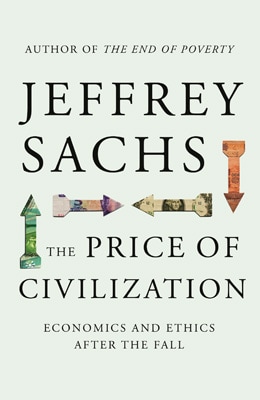Book Review: The Price Of Civilization - Economics And Ethics After The Fall
Review of JeffRey Sachs’s book on what went wrong in the US


Sachs’s book is very well written. He argues his case with data and analysis. He compares three periods of US history: 1955-1970, in retrospect the ‘golden age’ of the US economy 1971-1980, when the US economy was supposed to be in the doldrums and 1981-2010, the post Reagan era. The analysis reveals that by all significant measures—growth in GDP, GDP per capita, employment, and income inequality—performance has been worst in the post Reagan period, even worse than in the 1970s, the doldrums from which Reagan supposedly led the US economy into the sunshine. What went wrong? Sachs’s view, now shared by many, is that Reagan along with a rush of economist ideologues unduly demonised government and worshiped the market too much. The US has become a “corporatocracy” he says, and “turning money into power and power back into money are Washington’s leading industries”.
The book is in two parts. The first part, an analysis of the problem, concludes with a chapter on ‘The Distracted Society’. The second part, the solution—The Path to Prosperity, commences with a chapter on ‘The Mindful Society’. Sachs says that US’ politics and economy will work again when it overcomes three crises. The first is an ideological crisis: The mistaken belief that free markets alone can solve economic problems. The second is an institutional crisis: The large role played by corporations, “using their lobbying power to dictate terms of legislations and regulations”. The third is a moral crisis concerning the nature of democracy: “There is little systematic public deliberation and the public’s views are not taken seriously in the political process.” He recommends eight goals for the US over the next 10 years. These include raising employment, improving education, reducing poverty, improving governance, balancing the federal budget, and avoiding an environment catastrophe. These sound very similar to the goals of India’s 12th Plan! The last goal in his list is to “raise America’s happiness and life satisfaction”. With this he joins a growing band of economists who are questioning the primacy of increasing GDP as the goal of public policy. Perhaps one must get rich before one looks for happiness!
Sachs proposes that the US government adopt “Seven Habits of Highly Effective Government”. The first four are: Set clear goals and benchmarks mobilise expertise make multi-year plans and, be mindful of the far future. Since his diagnosis is that the US government bureaucracy, divided into silos, is unable to address cross-cutting challenges, and that the two-year electoral cycle makes it difficult for politicians to address long-term problems, one wonders how the US government will institutionalise these good habits. Perhaps it needs a Planning Commission! The other three habits are: Restore public management decentralise and end the corporatocracy. Decentralisation and improvement of public management are also emphasised in the Approach to India’s 12th Plan. There is concern in India too about ‘crony capitalism’, which was the forerunner in the US to the legalised and institutionalised processes of lobbying and electoral funding that, according to Sachs, have turned the US into a corporatocracy.
Sachs concludes his book with eight pages of recommendations of books by other authors that have influenced his thinking. I recommend Sachs’s book as well worth reading by Indian policymakers.
(Arun Maira is member, Planning Commission)
The Price of Civilization: Economics and Ethics after the Fall
By: Jeffrey Sachs.
Publisher: Bodley Head / Random House
Price: Rs. 599
Pages: 320
First Published: Jan 23, 2012, 06:06
Subscribe Now